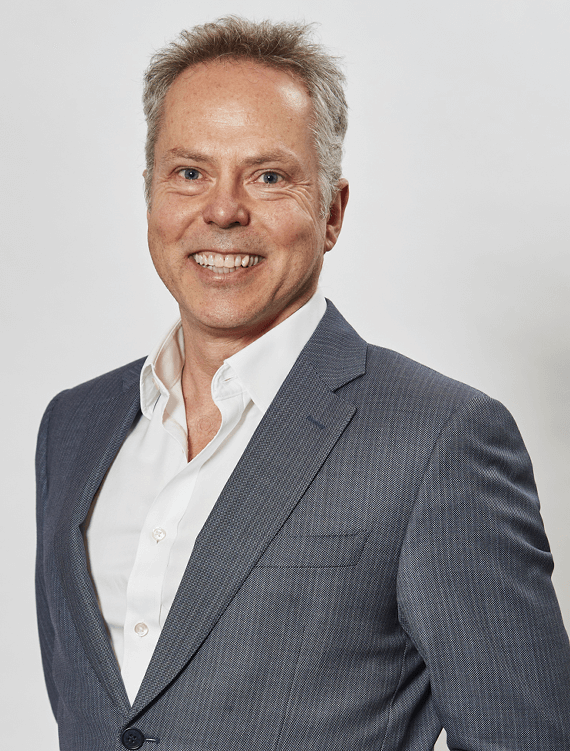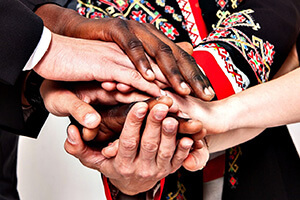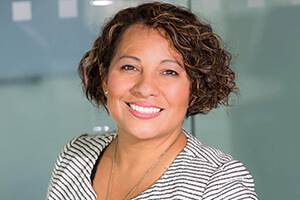Diversity & Inclusion

“Phillips Ormonde Fitzpatrick is committed to building an inclusive workplace culture where diversity is embraced and all people feel that they are respected, connected, contributing, and progressing. We aim to create an environment where everyone can be themselves at work every day.”
Andrew Massie, Managing Principal
Strategic Commitment
Our strategic Diversity & Inclusion (D&I) commitment is to provide a diverse and inclusive workplace where all our people experience a sense of belonging and thrive. Through encouraging and promoting diverse perspectives, and by embracing a culture of inclusion, we will attract and retain the best people and enable them to perform to their full potential.
Inclusion Pillars
We have identified five strategic Inclusion Pillars with leadership sponsorship supported by employee led networks to provide our people the opportunity to contribute to our inclusion work

Cultures and
Communities
Recognise the wide range of cultures, faiths and communities across our team and support cultural diversity including engagement with First Nations People.

Disability and
Accessibility
Remove barriers to meaningful employment, tap into neuro-diverse talent and provide dignified access for all people who access our buildings.

Gender
Balance
Reflect the gender representation in our communities in our Board, Management Committee and Leadership roles.

LGBTIQA+
and Allies
Provide safe and inclusive workplaces where people can bring their whole selves to work every day – regardless of sexual orientation, gender identity or gender expression.

Life Ages and
Stages
Support all life stages, share knowledge across generations, facilitate flexibility and care when people need it most including parental, elder, family and domestic violence support.
Our Statement of Reconciliation
We declare our commitment to working towards achieving reconciliation between indigenous and non-indigenous people. We share the vision of Reconciliation Australia, that reconciliation is about strengthening relationships between Aboriginal and Torres Strait Islander peoples and non-Indigenous peoples, for the benefit of all Australians.
We acknowledge and recognise:
- Aboriginal and Torres Strait Islander peoples as the first peoples of Australia.
- The loss and grief held by Aboriginal peoples and Torres Strait Islanders caused by alienation from traditional lands, loss of lives and freedom, and the forced removal of children.
- The customs and traditions of Indigenous Australians and their spiritual relationship with the land.
- The right of Indigenous Australians to live according to their own beliefs, values and customs, and the vital importance of Aboriginal and Torres Strait Islander people’s contribution to strengthening and enriching the heritage of all Australians.
- The need for a partnership approach with Aboriginal and Torres Strait Islander peoples as part of addressing the needs of communities.
Our focus areas and actions
Systems and Structure
Our governance and organisational frameworks, policies and practices deliberately support inclusion.
- Diversity and Inclusion strategy and action plans endorsed by Management Committee
- Leadership champions where each inclusion pillar is uniquely sponsored
- Policy reform including
- Diversity and Inclusion Policy: to outline our purpose, scope and guiding principles for how we value and manage diversity and inclusion.
- Public Holiday Substitution: provides employees the option to work on a public holiday, and take a different day as leave to observe any cultural or religious days that are important to them.
- Reasonable Workplace Adjustment Policy: to establish effective mechanisms for responding to the individual adjustment needs of existing and potential employees.
- Family Violence and Domestic Leave Policy: to provide support and resources to employees facing situations of violence or abuse in their personal lives
- Flexible Working Arrangements Policy: to support employees to balance their personal circumstances with work responsibilities
- Parental Leave Policy: paid and unpaid gender-neutral parental leave, with 12 weeks of paid parental leave for all carers, flexible paid parental leave taken any time during 24 months and superannuation contributions for the full 12 month parental leave period
- Pro-bono Policy: includes a focus on supporting organisations which support low income, disadvantaged or marginalised members of the Australian community
- Systemically building inclusion into everyday communication including pronouns and First Nations land details in our emails and Acknowledgement of Country protocols for events
- Employing a dedicated D&I Specialist to guide our strategies and actions
- Recognise and commemorate an annual calendar of inclusion dates with events, guest speakers and education sessions
- Use First Nations’ suppliers for event catering, firm celebrations, stationery and corporate gift procurement
Measures
Identification of inclusion metrics and goals aligned to our business strategy.
- Leadership gender equity: applying a gender lens to our leadership pipeline, conducting annual gender pay gap analysis, focusing on inclusive leadership behaviours and developing leadership skills through our talent pipeline
- Experience of inclusion and belonging:
- Phillips Ormonde Fitzpatrick was named an Inclusive Employer for 2024-25 as part of the Diversity Council of Australia Inclusion@Work Index. This is now the second time we have been recognised as an Inclusive Employer. Additionally, we exceeded the national benchmark for all the 9 key inclusion measures.
- Retesting our people’s experience of inclusion via the Inclusive Employer Index to measure our progress towards our goals.
Capability Uplift
Increase diversity, equity and inclusion awareness and capability across our workforce.
Comprehensive learning and development program including:
- D&I Awareness
- Unconscious Bias
- Inclusive Leadership
- Cultural Awareness
- LGBTIQA+ Inclusion
- First Nations Awareness
- Disability Confidence
- Deep dive self-directed learning resources
Dedicated D&I Resource
From October 2022 to October 2024, POF partnered with Kathleen Gaynor from OD Consulting as a Diversity & Inclusion (D&I) consultant to strengthen its D&I efforts across the firm.
During this period, Kathleen provided strategic guidance to help the firm retain existing staff, attract diverse talent, maximise employee potential, and foster a deeply embedded culture of diversity and inclusion throughout the firm. To learn more about Kathleen’s work at POF, please read her interview with Managing IP’s Special Projects Editor, Sukanya Sarkar.
